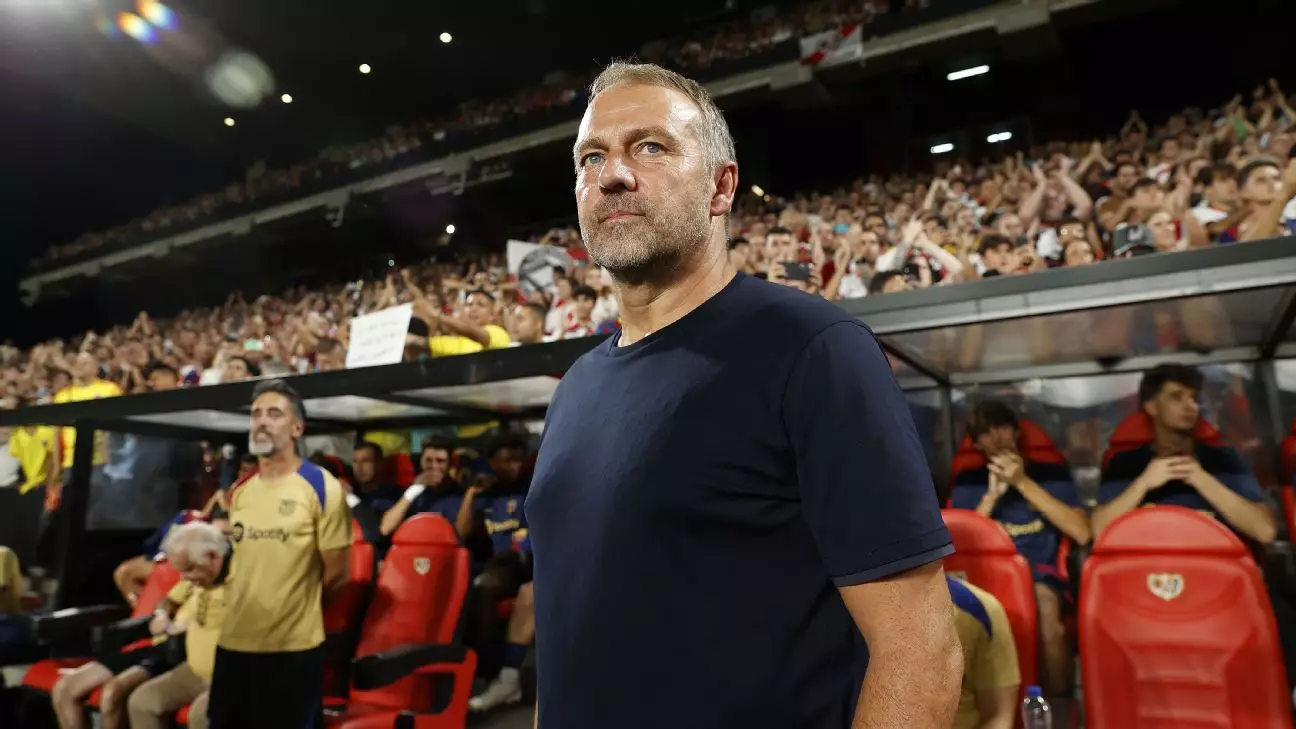The footballing world was treated to a shocking twist when FC Barcelona, under the watchful eye of head coach Hansi Flick, faced a setback during their visit to El Sadar on Saturday. After a commendable seven-game winning streak in La Liga, the Catalan giants stumbled, losing 4-2 to Osasuna, marking their first defeat of the season. This unexpected loss raised critical questions about team management, strategic choices, and the overarching responsibilities of the coaching staff.
In the aftermath of the match, Hansi Flick didn’t shy away from shouldering the blame. His decision to implement wholesale changes to the starting lineup played a significant part in the lackluster performance. Flick acknowledged that his intent was to manage player fatigue, given the congested fixture list and the number of matches players had participated in. In his post-game address, he stated, “If you want to blame someone for this defeat, blame me.” It’s a rare admission of fault that opens discussions about coaching methodologies and the fine line between squad rotation and fielding a competitive side.
The changes made by Flick included resting key players like Lamine Yamal and Raphinha, which may have upset the team’s rhythm. While rotation is a natural part of managing a football club, especially with players accumulating heavy minutes, it begs the question of whether Flick’s approach on this occasion was excessively radical.
The first half of the match against Osasuna saw Barcelona quickly fall behind as Ante Budimir’s header found the back of the net after just 18 minutes. This setback was compounded when Bryan Zaragoza extended Osasuna’s advantage just before halftime. However, Flick’s side responded in the second half with Pau Víctor’s goal, temporarily reigniting hope among fans.
Yet, the turning point was not long coming. A penalty awarded against Barça after a foul from debutant Sergi Domínguez, who was one of the replacements, sealed their fate when Budimir scored again. The confidence Barcelona had briefly garnered after pulling their deficit back to 2-1 was crushed in that moment, showcasing the critical impact of major decisions made during high-stakes matches.
Looking Forward with Positivity
Despite the loss, Flick expressed optimism about his team’s prospects. He highlighted a positive trajectory thus far and emphasized the forthcoming fixtures against Young Boys in the Champions League and Alavés in La Liga as opportunities to bounce back. His analysis of the situation suggests a commitment to learning from mistakes rather than dwelling on them. He remarked, “I am always looking forward, and I am positive.” This forward-thinking mindset will be crucial as the team seeks redemption.
Flick further acknowledged the challenges inflicted by injuries, indicating that players like Dani Olmo and Frenkie de Jong would return post-international break, potentially restoring stability to the squad. His focus on squad depth and the importance of having a robust lineup reflects an understanding of modern football dynamics, where managing player fatigue and adaptability is paramount.
The Road Ahead: Immense Pressure on Strategy
Flick’s philosophy that necessitated drastic changes will be tested in the upcoming matches. The expectation is for Barcelona to not only rediscover their winning form but to do so against competent opposition, starting with Young Boys, who boast a pacey squad capable of unsettling even the strongest sides.
Flick’s early tenure at the club suggests a tactical finesse that, if harnessed correctly, could usher in a rejuvenated Barcelona. However, it’s clear that maintaining balance in squad rotation while ensuring a competitive edge is a delicate act. As the Catalan club stands atop La Liga, four points ahead of their rivals, the task now is to transform this defeat into a learning experience and reestablish their dominance in both domestic and European competitions.
While Barcelona’s loss against Osasuna demonstrates the vulnerabilities inherent in managing a prestigious club, it also sets the stage for Hansi Flick to reinforce his methodologies and strengthen this promising Barcelona side. The path is laden with both challenges and opportunities, warranting both introspection and optimism as the team prepares for their next encounters. The resilience of FC Barcelona will undoubtedly continue to be tested in the weeks ahead, but the foundations laid thus far indicate they are a side poised for greatness.

